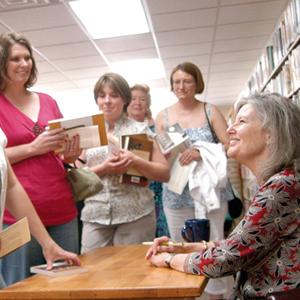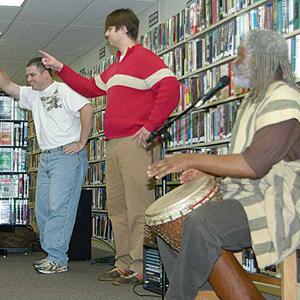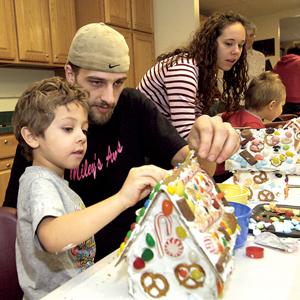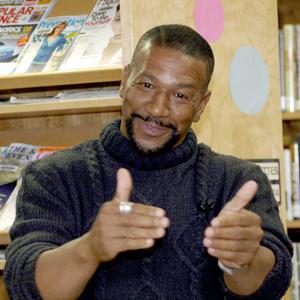Planning interesting innovative programs on a limited budget is a daunting task, but with a dose of enthusiasm and a dab of ingenuity, it’s easier than you’d think. The following storyabout how our tiny library was able to host New York Times best-selling author Elizabeth Berg illustrates some of the major elements to keep in mind when planning programming on a shoestring budget.

Originally, I had tried through her agent to schedule a speakerphone chat for “Dream When You’re Feeling Blue” for our book discussion group. But Elizabeth doesn’t like speakerphone chats; she loves doing readings and asked if our library ever hosted authors.
I sent her a long email in response:
Oh, phone chats are so fun! I’m sorry you don’t enjoy them. The first one we did was with Steven Sorrentino (“Luncheonette”) and it was also his first book discussion chat. He started off telling us he had done lots of conference calls by speakerphone in his work for a publishing company so he was quite experienced with it. Then he caught us off guard by saying this was the first one he had done in the nude. When we stopped laughing, one of our ladies retorted, “Well, I thought you might want to know, we’re all naked here, too!”
We do host authors in person, but I am guessing we are way out of your league. We’re a small library, so we don’t have a huge budget to host big-name authors like yourself.
This scenario is more our speed: the Ultimate Cheapskate, Jeff Yeager, author of “The Ultimate Cheapskate’s Road Map to True Riches: A Practical (and Fun) Guide to Enjoying Life More by Spending Less” visits our library, is served a wonderful lunch of homemade manicotti, homemade bread, and a fresh garden salad with just picked tomatoes, prepared by Liz Stella, our former director, who married an Italian from the hills of West Virginia and learned to cook from her first generation Italian-American mother-in-law … Yeager speaks to a group of 66 people at 2 on a weekday afternoon and sells lots of books and he ends up paying us $100!
That’s a bit unusual, but he had such a good time here, he decided to offer us the deal he gave libraries on a book promotion tour he had just finished. He biked from library to library and gave his publisher’s per diem to the libraries if they arranged for somebody to put him up overnight …
Elizabeth responded with this email:
What a charming letter! So let’s see what we can do here. First of all, fresh-picked tomatoes: a must. Ditto homemade bread.
When I speak through my lecture agent, I get $5,000 which I rush to add I’m sure you can’t afford. So here’s the deal: do you think you can get over 100 people and good books sales? And some tomatoes to take home?
If so, give me your best offer, and let’s see what we can work out.
The email exchange continued with negotiation on price and book sales—and promises of more of Liz’s specialties:
Tomatoes, bread … even homemade brownies using the Zingerman’s recipe (the most divine brownies known to womankind) and sticky toffee pudding which sounds horrible, but is the most luscious dessert known to all of humanity.
… I think I could offer something in the $300 to $500 range. That sounds so paltry compared to your usual fee, but your usual fee is our programming budget for the entire year! I promise you, though, Zingerman’s brownies and sticky toffee pudding made by Liz are utterly priceless and totally worth your time … along with the tomatoes.
Elizabeth proposed this scenario:
… For my payment, start with $500, but for every person over 100 that you get, take $10 off my fee, but up the portion size of the sticky toffee pudding. …
In the end, we settled on a flat $500 fee, and then won a $500 Quick Grant from the Michigan Humanities Council. One little no-cost email resulted in one of our lowest-cost, but most satisfying and well-attended, programs.

Low-Cost Programming Tips
Here’s some advice that works for us in planning successful low-cost programs:
• Keep your ears and eyes open to program ideas, especially on discussion lists. I found out about Jeff Yeager when a librarian in California raved about him on the ALA pubprgrms list.
• Apply for grants that you stand a chance of getting and that don’t require a lot of time to write. Lobby your state Humanities Council to offer a Quick Grant program if they don’t already have one.
• Don’t be afraid to ask anyone you’d like to host, even if they’re famous.
• Use what you’ve got. We’re lucky. We have Liz Stella and her amazing culinary skills, but you probably have a Liz somewhere in your community. Find her.
• If you can’t get what you want, find the next best thing. Hosting an author in person is great, but speakerphone chats are pretty wonderful, too. Skype, of course, would be even better.
• Convey your enthusiasm in your requests, but be genuine.
• Be selfish! Don’t hesitate to plan programs that intrigue and interest you personally. At the same time you’re striving to appeal to the interests of a wide variety of your community members, you’re also being a little self-centered: planning a program is like planning a party, and you’re running the show. It’s special and fun; you want to offer your guests a good time, and you’re thinking about what they might like. But, you’re also cooking up foods you enjoy, and decorating to please your tastes—and your guests are going to love it. So, don’t hesitate to pursue program ideas for which you have a lot of excitement and enthusiasm. It will bubble over to others.
• Provide food! In addition to the meal we provided Berg, we served refreshments afterward to the audience. Find a way to provide good and special refreshments that make it worth a person’s while to attend the event. Literally, leave them with a good taste in their mouths.
Barn Again It
The Elizabeth Berg story shows how enthusiasm and ingenuity can result in a wonderful program on a shoestring budget, but it doesn’t illustrate one of our most successful program strategies: “Barn Again It,” in which “Barn Again” is the verb, and “It” is a program idea. “Barn Again It” is an action-loaded directive that has resulted in innovative programs and expressions of creativity, such as covering the walls and shelves of our library in paper dots of every color and size to welcome Tyree Guyton of Detroit’s Heidelberg Project. Guyton visited as part of the Michigan Notable Book award program for his book, Connecting the Dots.
Until we won a Michigan Humanities Council grant in 2004 to host the Smithsonian Institution’s “Barn Again! Celebrating an American Icon” traveling exhibit for six weeks, we didn’t offer much beyond the basics (storytime, summer reading, book discussion, an occasional author) in programming. Hosting “Barn Again!” came with the expectation that we would also host many programs and related exhibits in conjunction with it. Although we had received a grant, we were concerned about funding.
At a gathering of coordinators from all the Michigan sites hosting the exhibit, one coordinator mentioned a presenter whose fee, she said, was very inexpensive. Liz and I got excited at the prospect of also hosting him … until the woman said his cost was $250. Liz and I both burst out laughing because we thought the price was so high; we were expecting to find local presenters to do programs for free. But we saw what other libraries and institutions were doing and what their expectations were, and we changed our outlook. We thought of everything we might want to do that was related to barns and then started applying for grants or finding a cheap way to do it. “Barn Again!” changed our entire outlook on what we could offer for programs and how we could make them happen. Among many other activities and events, we hired performers for our “Down on the Farm” summer reading program (funded by grants) and the Ohio Barn Artist to paint a scene on a local barn (funded by Gleaners Insurance); we partnered with local churches to host a quilt tour, with the Garden Club to host a barn tour, with a local runner to plan a “Barn to Run” 5K race.
So, we used to do programs on a short, white shoestring, and now we have a really long colorful shoestring. Now we offer programs that run the gamut from musical and theatrical performances to speakers and authors, from classes and art exhibits to demonstrations and contests. We no longer see ourselves as just a little rural library serving 3,134 people. Now we know we can make happen whatever we can dream up.
We do it with lots of community support and with a strong partnership with our school system. We didn’t cut out all those hundreds of dots for Tyree Guyton; our high school volunteer club did.
We didn’t grill the hotdogs for the tailgate party we planned to celebrate author Michael Rosenberg’s visit for War as They Knew It, a book about the University of Michigan/Ohio State football rivalry; a couple of patrons trucked their grills to our parking lot and cooked them up.
We didn’t build or pay the cost of wood frames for our Picturing America art posters featured in our “Picturing New York … in a Tiny Midwest Town” program extravaganza; our high school art teacher won a grant from our local education foundation and a local woodworker donated his labor.
“Barn Again It” pretty much means taking a theme to the extreme, which is why we were playing stoopball on the front steps and stickball in the alley and serving chocolate egg creams and black and white cookies during our “Picturing New York” program.
State and national programs provide great opportunities for bringing stimulating programs to your library. Even if you don’t win the grants that go along with them, you can glean wonderful ideas for programs to host in your library. One program that every library can easily participate in is the American Library Association’s National Gaming Day (planned for November 12 in 2011). Collect games purchased on sale or at garage sales, or ask staff and patrons to share, and set them out on tables. Collect any kind of stuff for prizes and offer refreshments donated by your Friends group or patrons. You can host a Game Day any day, but participating in ALA’s National Gaming Day makes it all the more fun. Sign up early … there may be free games available.

Low-Cost Programming Ideas
Other programs we’ve hosted include these no-cost, very- low-cost or can-be-modified-to-be-very-low-cost ideas:
• Book discussion group: Interloan books (choose titles that are not currently in high demand); meet monthly; rotate discussion leaders or seek out volunteers.
• Speakerphone chats: Find authors on their websites, Facebook, Michigan Center for the Book, or the Book Club Cookbook. You only need a speakerphone (print a headshot of author to put in plastic display frame near phone) or use Skype, if author does.
• “Talk @ Two” discussion group: Meets every Thursday afternoon at 2 to discuss issues, from local to international, from abortion to religion.
• Art exhibits from schools: Partner with art teachers at local schools to create art that relates to programs you are planning or just to showcase student talent. Teachers like that their students’ work gets a different audience, parents come to the library to see the work and attend related program. Use tops of bookshelves and any wall space (you can attach lightweight art with blue painter’s tape).
• Human Library (known as the Living Library when we participated): Get sponsors for shirts, donations for refreshments.
• Magnetic Poetry Jam/Slam: Buy magnetic poetry sets, give set amount of time for patrons to come up with poems and then recite them.
• How-to programs, such as making a fruit cascade, knitting; give people what they want to know or what you are excited about.
• Fantasy Village: Create cardboard gingerbread houses in advance and ask community to donate stale crackers, cereal, pretzels, old Halloween candy, etc. Spread royal frosting on the houses and decorate with donated items.
• Ask a Lawyer, Ask a Financial Planner: Professional gives an overview of what they offer, patrons can ask any kind of questions. Strictly informational, no promotion or sales.
Some long, fancy shoestring programs, such as those involving storyteller La’Ron Williams or Lori Fithian of Drummunity, are worth every penny. If your budget doesn’t allow for special programs, look for grants, ask for donations, or talk to your Friends group to sponsor them.
Not only does live entertainment inspire and enrich lives, but along with its intellectual and cultural value, it provides economic value to communities as well. People come from all over to hear the Paul Keller Jazz Trio and then may go out to dinner at the Pizza Box afterward. Or maybe they’ll see Morenci has a really cool theater and come back with the kids another day.
Stimulating special programs also offer a real sense of community for those attending. Participants linger over refreshments, neighbors visit with neighbors, and friends are made. Hosting an author on a topic such as coaches Bo Schembechler and Woody Hayes and their University of Michigan/Ohio State rivalry brings in a whole new crowd; reaching out to all segments of the community keeps your library vibrant and relevant.
Inspiration
To find ideas and inspiration for programs, check out these websites:
• Your state library.
• Your state humanities council. If your state’s council is weak, look at what other states offer. You’ll find ideas galore.
• American Library Association Public Programs Office. Subscribe to pubprgrms and ppogrants lists.
• Programming Librarian. Incredible wealth of information on this site. Click “Library” on top bar, click Programs. Check out everything on this site … lots of ideas.
• National Endowment for the Humanities. We the People Bookshelf offers endless ideas for programs. The Picturing America application period is over, but see if a school or library near you has a set you could borrow. We have an amazing art teacher at the high school who uses the Picturing America art posters to inspire her students to create art that we display at the library.
Other points to consider during program planning that help ensure a successful event:
Collaboration
• Schools: Make friends with teachers and administrators, promote programs for kids in elementary school weekly newsletter.
• Churches: Ask to have programs mentioned in church bulletin. (We limit requests to major programs of broad appeal.)
• Chamber of Commerce, Kiwanis and other service clubs, and area organizations such as a garden club, 4-H groups, or senior center.

Planning Pointers
• Scheduling: Contact schools about a date you are planning an event to avoid conflicts; you can check an online school calendar and confirm with school secretary. Sports are hard to compete with, and major events that involve a wide range of ages such as band performances will really cut down on your audience.
• Volunteers: Approach Friends group, VolunTeens, and high school volunteer clubs; print a notice in newspaper for whatever is needed; or offer sign-up sheets in library.
• Space issues: Consider moving furniture around to create open space. Put furnishings on wheels or gliders to facilitate. Enlist teen volunteers to help set up before and clean up afterward. Have your local Department of Public Works move big items out temporarily. Borrow chairs if necessary.
• Sound system: A small, cordless, portable one is nice, especially for older people with hearing problems.
• Don’t forget the little details: Water for the speaker, extra toilet paper and paper towels in bathrooms, a table set up to sell books.
• Flexibility: Try to work in time to take advantage of programs that come up suddenly. Last-minute or close-to-event planning keeps things fresh and interesting. Plan too far in advance, and a million other things get scheduled on the event date that hadn’t been on anybody’s calendar when you did the planning.
Publicity and Promotion
• Use in-house signs on doors, bulletin boards; simple bookmarks created in-house on colored paper, four to a page, are easy to pass out in the library and local stores and schools; hang simple posters around town; place notices in school newsletters and in church bulletins; give flyers for distribution to friendly businesses, especially pizzerias, hardware stores, laundromats—any high-traffic store; and ask local grocery stores to stuff flyers in bags.
• Target your anticipated audience: For whatever program you are hosting, consider who would enjoy it the most and reach out to that group. We get a class count list from the elementary school and count out the number of flyers needed for each classroom, labeled with teacher’s name. For the senior center, we deliver bookmark flyers on the day they’re having the best meal.
• Make an email contact group for media and email announcements, and make follow-up calls on important events.
• Make contact groups for the Friends group, patrons who regularly attend events, etc. Remind all groups a day or two before events.
• Call regular patrons day of event to remind them to attend.
• Place a banner outside library, if budget allows
• Post on your website, Facebook, etc.
Program Enhancements
• Refreshments—serve good ones. Ask patrons or your Friends group for donations of baked goods, cut-up veggies, fruits. Have a wide variety of easy-to-eat finger foods: offer good things so people linger and visit with each other while munching. Use cloth tablecloths and nice serving dishes.
• Designate a hearing impaired section with reserved seats.
• Treat the presenter as an honored guest. Provide snacks or a meal and water at the podium, anticipate their needs, and sell their books.
There’s a great universe of program ideas out there with lots of pretty shoelaces. Consider what your community might like, but also follow your passions. Watch that strategy result in interesting, innovative, creative programming that doesn’t have to cost $5,000 a speaker. Just ask Elizabeth Berg.



